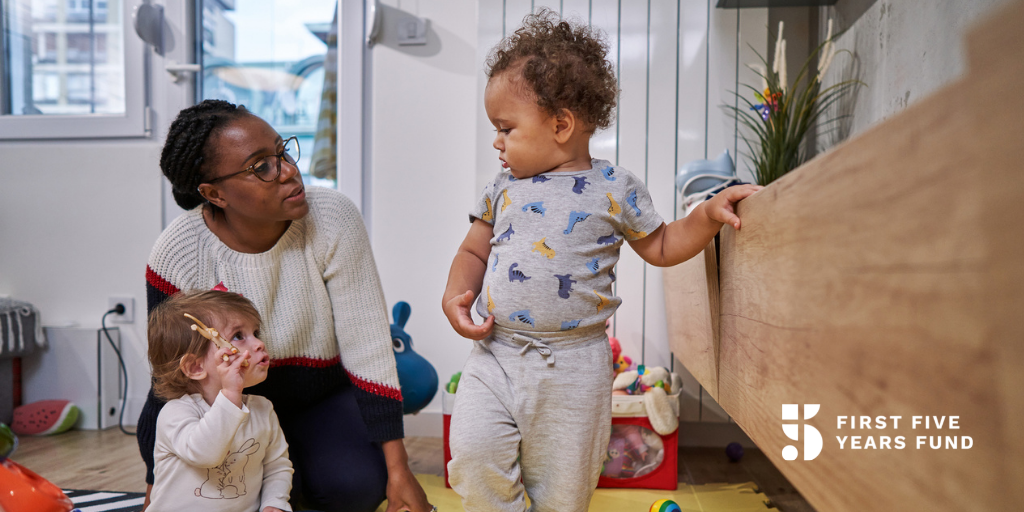Child Care & Pre-K are Strategic Economic Investments: Impact on Health

As Congress considers the Build Back Better Act, the White House recently released President Biden’s Build Back Better Agenda Will Boost Economic Growth, a fact sheet analyzing how various policies within the Build Back Better Act will “increase labor force participation, improve living standards, enhance U.S. competitiveness, and boost economic growth in the decades to come.” Following the release of this fact sheet, this is the second blog in a series identifying why both child care and preschool are critical policies that not only provide needed investments to support parents, children, and providers, but also promote long-term societal economic and health benefits.
Beyond education, child care and preschool also have prominent impacts on the health of children and their families. Investing early in young children results in significantly better health and life outcomes and reduces health care costs throughout the child’s lifetime. Public investment in high-quality early childhood programs, like those included in the Build Back Better Act, is shown to generate long-term cost savings for society by improving health outcomes on a population level, as well as mitigating expensive downstream costs to the health care system.
High-quality child care and preschool programs can improve children’s health outcomes throughout their lives and generate long-term savings for individuals and society in four key ways.
- Prevent/reverse the damaging effects of ACEs.
It is during the first few years of life that the brain undergoes the most extensive development and brain circuitry is the most sensitive. Early life stress or adverse childhood experiences (ACEs), which affect as many as one in four preschool-aged children, can have lifelong mental and physical effects. These events, such as physical and emotional abuse, neglect, caregiver mental illness, and household violence, can contribute to developmental delays in infancy and toddlerhood, as well as long-term poor health outcomes including heart disease, diabetes, depression, and alcoholism in adulthood if not properly supported at a young age. Living in poverty increases the likelihood that a child experiences one or more ACEs, as low income children are more than twice as likely to have had three or more ACEs. Stable, caring relationships are essential for healthy development and to mitigate the negative effects of ACEs.
High-quality early childhood education programs provide supportive caregiving that can prevent or reverse the damaging effects of toxic stress and create healthier long-term outcomes. Reducing the effects of ACEs helps set up young children for success as those who are healthier are better able to engage in school, graduate, and participate productively in the workforce. Child care and preschool providers also play a critical role in preventing and responding to child abuse and neglect. Studies have shown that high-quality preschool programs can mitigate the effects of poverty, and children are less likely to be abused and neglected. This protects children and saves downstream costs in the Child Protective Services budget.
- Improve nutrition and physical health.
Early childhood programs improve children’s nutritional status and practices and physical health. Research finds that children in high-quality preschool programs engage in healthier eating habits and are less likely to have hypertension and high blood pressure later in life. Considering the annual health care cost of obesity-related illnesses in the U.S. is $190.2 billion annually (approximately 21% of annual medical spending), investing in healthier children is critical. Additionally, children who attend high-quality early learning programs have better physical health as programs help to connect families to important health services, such as the Children’s Health Insurance Program (CHIP).
Another significant health benefit can be seen in oral health prevention and treatment. Children who have poor oral health are more likely to miss school, which has negative consequences on their academic engagement and employment outcomes. Data shows that children who attend child care and preschool programs are more likely to have access to services and information about proper oral health practices. Such preventive dental services mitigate school absences, related health issues, and significant dental intervention costs later in life.
- Support children’s physical and cognitive development.
High-quality child care and preschool programs improve the physical development of babies and young children by helping to identify and support developmental delays and ensure proper immunizations. These are critical in helping children reach developmental milestones that will create beneficial health outcomes later in life. Additionally, investment in the socio-emotional and cognitive development of children is well researched and long-lasting. Children who attend high-quality early education programs have fewer teenage pregnancies later in life, reduced engagement in risky health behaviors such as substance abuse, and improved mental and physical health associated with increased employment and higher earnings.
- Improve parents’ mental health and parenting skills.
The health benefits of child care and preschool go beyond the young child to also create positive benefits to the child’s parents. Many child care and preschool programs include parent support services, such as home visiting programs that teach parenting skills and support parents with mental health services. These decrease parent stress, improve mental health, and can reduce the likelihood that children experience abuse. Studies show that high-quality early care and education decrease maternal substance abuse and improve maternal reproductive health.
Healthy childhood development is a key indicator of future health outcomes, as healthy children are more likely to be academically engaged, have higher employment and earnings, and use costly systems less frequently. Investing in child care and preschool in the Build Back Better Act represents an investment in health and a thriving future workforce.
Subscribe to FFYF First Look
Every morning, FFYF reports on the latest child care & early learning news from across the country. Subscribe and take 5 minutes to know what's happening in early childhood education.



